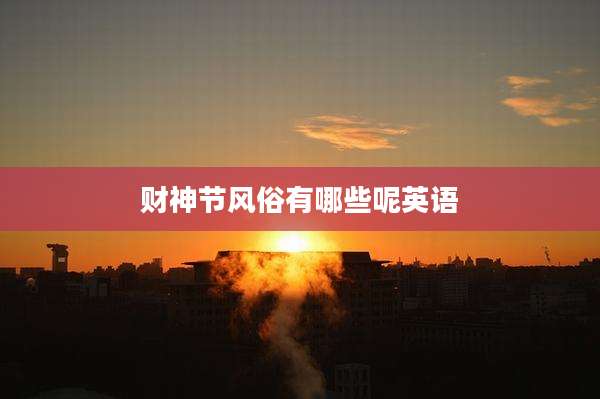财神节风俗有哪些呢英语
八字 | 2025-03-21 18:41:29
In many cultures around the world, festivals are celebrated with a variety of customs and traditions that reflect the values and beliefs of the community. The财神节, also known as the God of Wealth Festival, is no exception. Here are two articles detailing the customs and traditions associated with this festive occasion.

---
The God of Wealth Festival, a time of prosperity and good fortune, is celebrated with a myriad of customs and rituals that are deeply rooted in Chinese culture. One of the most prominent customs is the decoration of homes and businesses with red lanterns and couplets. Red, symbolizing luck and happiness, is the predominant color during this festival. Homes are adorned with red banners, paper cuttings, and other festive decorations to invite wealth and good luck into the household.
Another significant custom is the offering of sacrifices to the God of Wealth. Families gather to prepare a feast that includes a variety of dishes, each with symbolic meanings. For instance, fish, which symbolizes surplus and abundance, is a must-have dish. Gold-leaf-covered fruit, like oranges and tangerines, are also placed on the altar to represent wealth and prosperity. The offering ceremony is followed by a family meal, where everyone partakes in the feast, hoping to bring prosperity to their lives.
In addition to the home celebrations, the streets come alive with parades and performances. Traditional Chinese dances, such as the dragon and lion dances, are performed to ward off evil spirits and invite good fortune. Fireworks and firecrackers are also set off to scare away misfortune and bring in prosperity. These vibrant displays of color and sound are a testament to the joy and excitement of the festival.
The God of Wealth Festival is also a time for giving. It is customary for people to exchange red envelopes, or "hongbao," containing money. These envelopes are given to children, friends, and family members as a symbol of good wishes and prosperity. The act of giving is seen as a way to foster positive relationships and ensure a prosperous year ahead.
---
The God of Wealth Festival is a time when people come together to honor the deity of wealth and prosperity, and to seek blessings for the year ahead. One of the most enduring customs of this festival is the preparation of traditional foods that are believed to bring good fortune. Nian gao, a sticky rice cake, is a popular dish during this time. It is made from glutinous rice and is often cut into squares or diamond shapes, symbolizing wealth and prosperity. The act of eating nian gao is not only a culinary delight but also a way to wish for a year filled with success and happiness.
In addition to nian gao, other traditional foods are also prepared and consumed during the festival. Fish, for example, is a symbol of abundance and prosperity, and it is often served whole, with its head and tail intact, to represent the beginning and end of a successful year. Another dish that is commonly prepared is longevity noodles, which are long, uncut noodles that are believed to bring longevity and good health.
The festival also involves the distribution of lucky charms and amulets. These include red envelopes, which are given to children and the elderly, and paper cuttings, which are intricate designs made from red paper that are believed to bring good fortune. People also wear red, which is considered a lucky color, and may carry small red bags or wallets filled with coins, known as "fu" or fortune bags, to attract wealth.
The celebration of the God of Wealth Festival is not limited to the home. It extends to the community, where people gather in temples and public spaces to offer prayers and perform rituals. The streets are filled with the sounds of traditional music and the vibrant colors of lanterns and banners. It is a time for people to come together, share in the joy of the festival, and wish each other prosperity and happiness.
In conclusion, the God of Wealth Festival is a time of celebration, reflection, and hope. Through its customs and traditions, it brings people together in a shared pursuit of prosperity and good fortune. Whether through the decoration of homes, the preparation of traditional foods, or the distribution of lucky charms, the festival serves as a reminder of the importance of wealth and happiness in the lives of all.
「点击下面查看原网页 领取您的八字精批报告☟☟☟☟☟☟」